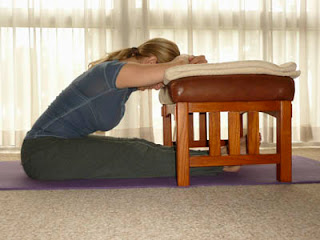Sanskrit: pascimottanasana Western Term: seated forward bend
Origin of Word:
pascima = back; uttana = extension
Type of Asana:
sitting pose
How To:
1.
Sit in dandasana
(staff pose). Exhale as you lean forward, extend your arms, and reach for the
feet. Inhale to pull on the feet (pinky-toe-side-of-the foot) or lateral side
of the legs while extending the upper body up from the pubis. Stretch both
sides of the pubis and open the chest. Make the bag concave and look upward.
2.
Exhale to bend the elbows outward. Move the
pubis back in order to bring the hips closer to the thighs. Open the sits-bones
away from each other. Simultaneously extend the front, sides, and back of the
body toward the legs.
3.
Rest the head on the shins, preferably the chin
to the shins. Keep the head and back relaxed. Stay for 30-60 seconds.
4.
Inhale to come up.
Body Points:
*Keep the feet and ankles together and keep the feet flexed
to stretch the Achilles Tendon.
*Maintain the extension of the legs and trunk without
becoming tense.
*Don’t let the legs roll outward. Pull up on the outer thigh
muscles and keep the knees pressing down. Keep the head and upper body relaxed
on the legs.
*Use your breath to help you find yourself deeper in the
pose. On each inhale come into flat back and on each exhale fold a bit deeper
over the legs.
Emphasized Body Parts: Hip flexors, hamstrings,
spine, and muscles of the feet
Mental Benefits:
calms the mind and improves concentration
Git rid of that belly with pascimottanasana
Other Benefits of the
Pose:
-this posture is good for reducing belly fat and extra
weight from the hips
-recommended for women after delivery or during menopause
because it helps to strengthen and slim shape
-liver, kidneys, pancreas, and ovaries benefit from this
pose-giving your digestion and appetite a boost
-helps regulate blood pressure
An aid for beginners:
kramas or levels of a pose give us
yogis with various levels options. For any given pose, there are various levels
of difficulty. This krama that I
offer is for beginners to the pose: use a chair pushing against the wall. Sit
on the edge of the chair and bend down over the legs, gravity will help you
bend over further. Keep hands on the floor.
A restful variation
A restful variation
on the pose (for all levels): Use a blanket or small stool folded on the shins. Rest the
forehead on the folded blanket or stool and stay for 2-3 minutes. Do not strain the
back.
Chakra: Muladhara chakra; solar plexus center. First chakra which is red and symbolized by a
four-petaled lotus.
Stimulating the first chakra with poses like pascimottanasana help build a strong
foundation.
Seed sound (bija
mantra): Lam, repeat the mantra while in the pose and come closer to unlocking
the secrets of the earth
Ancient Sanskirt Proverb:
“Regular exercise gives you good health, longevity, strength, and happiness.
Health is the biggest wealth. It is the key to every success.”
Element: Earth
*Avoid doing this pose if
you suffer from back injuries or diarrhea
Pascimottanasana
helps to stimulate the digestive qualities in the tummy and rev up your
metabolism. Perhaps you’re hungry? Maybe even ravenous? Here is a not-so-guilt-free
recipe that I did not create. In fact, Trader
Joe’s, one of my favorite places, are the creators of this fall-time dish. It’s
easy to whip up, a bit sinful, and absolutely delicious.
Ingredients:
1.
Trader Joe’s
pumpkin pancake/waffle mix (I believe, it’s only sold during the fall because
it’s such a seasonal dish)
2.
2 Tablespoons Melted Butter
3.
¾ Cup Milk
4.
1 Egg, lightly beaten
5.
Real Maple Syrup (don’t buy the fake stuff. It
tastes grosser and is worse for you)
Add strawberries to make yourself feel a bit healthier ;)
Enjoy the foliage and have a good weekend!
Sources:
Mira, Sylva & Mehta, Shyam. “Yoga the Iyengar Way: the
new definitive illustrated guide.” Forwarded by B.K.S. Iyengar. US, New York:
2010.
http://www.jaisiyaram.com/yoga-poses/paschimottanasana.html.
Viewed 10/9/12.
http://yoga108.org/pages/show/100-paschimottanasana-the-seated-forward-bend-yoga-posture-followed-by-the-inclined-plane.
Viewed 10/9/12.
http://tulaa7.com/chakra1-red.html.
Viewed 10/9/12.








No comments:
Post a Comment